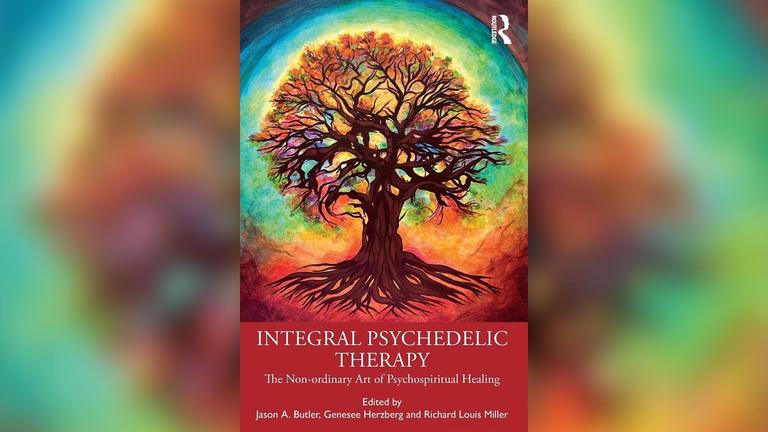At each CIIS Open House event, a community panel of faculty and alumni discusses what drew them to CIIS and their experiences at the University.

Non-Ordinary: Prof. Jason Butler Discusses His New Book
CIIS Professor Jason Butler discusses his new book on the potential, pitfalls, and guidelines for psychedelic medicine and care in treating mental illness.
While many of us were baking bread or trying our hands at urban birdwatching, Professor Jason Butler, a leading expert in the field of psychedelic medicine, spent a major part of his pandemic on a slightly different healing endeavor. He helped write and edit an entire book.
Integral Psychedelic Therapy: The Non-Ordinary Art of Psychospiritual Healing, out now from Routledge press, is an in-depth exploration of how psychedelics can most helpfully be incorporated into psycotheraputic practices. Social justice is interwoven with everything Prof. Butler studies and teaches, and his co-edited book ensures that equity in access and treatment is always at the forefront. In the 14 chapters, written by experts but accessible to any interested readers, Butler and his colleagues articulate a practice and an ethos of care that will help practitioners and clients both.
CIIS: So how did you get into this field? What’s your superhero origin story?
Professor Butler: My father was a combat vet. He fought in Vietnam and struggled with alcoholism throughout his life, which was cut short quite early, at age 46, just before I was about to turn 16. He ended up dying from an alcohol-related condition. Although my family didn't have this language at the time, I can see now that he was struggling with untreated Post Traumatic Stress Syndrome. Part of the calling into working with psychedelics is seeing how effective MDMA-assisted psychotherapy can be as a treatment for PTSD.
I have also benefited greatly from my own use of psychedelics, starting off quite young as a raver, going to dance events. I’ve had numerous profound experiences dancing outside with my community of friends and feeling a reprieve from the struggles I was in, able to connect with people in ways that I hadn't been otherwise. So I was aware of the potential of these medicines from a really early age.
I feel a deep personal calling to help make these treatments accessible and to bridge the worlds of depth psychotherapy and the therapeutic use of psychedelics. Part of my motivation to contribute to the field of psychedelic therapy is to bridge depth, relational, liberation psychology, and trauma-informed approaches into the therapeutic framework for using psychedelics. And that is the primary premise of the book.
CIIS: Can you talk a little bit about how you got into social justice work and making sure that there is equality in access? I’m talking specifically about one particular article, “Blinded by the White.”
Prof. Butler: I'd say my passion for social justice goes back to my exposure to punk music as an adolescent, which introduced me to political and social views that center liberation and radical equality, standing in solidarity with those that are most targeted by systems of oppression. Regarding psychedelic therapy, there's a significant need to increase accessibility by bringing the cost of treatment down and broadening the diversity and representation in the field. These treatments have a lot of potential. That potential is dramatically impacted by the inaccessibility due to cost as well as the whiteness and heteronormativity of the field.
CIIS: I can imagine that someone who shares a racial identity could provide a very different experience. Are clinical trials accounting for that right now?
Prof. Butler: More so than ever before. I'll speak to the MAPS research because that's the organization that I am most familiar with: the organization as a whole has been quite receptive to feedback from the MAPS clinicians, trainers, and other social justice advocates within the organization regarding the need to become far more culturally sensitive and aware of the social dimensions that are active in this work as well as the potential pitfalls and places where people could be and have been harmed. For example, in the MAPS MDMA-assisted therapy training program, they've woven in topics around power and privilege, intersectionality, and working across differences. It's still a real growing edge for the organization as a whole. But I'm encouraged by the amount of receptivity and the amount of concrete actions MAPS has taken in this direction, including hiring folks who represent diverse identities as trainers and as research clinicians.
In the article that you mentioned, we point to the history of the devastating war on drugs, medical racism, and the exploitation of Black, Brown and Asian communities to test out experimental treatments in ways that are quite violent to the participants. This history is an always present factor in the psychedelic field, even if we're not conscious of it. As a white psychedelic therapist, I aim to hold this historical context very consciously and to make use of this awareness to build trust and to discuss potential factors that may impact the client’s sense of safety.
CIIS: How did you come to meet your coauthors and coeditors? Were they colleagues? Was there an open call?
Prof. Butler: The authors are all close colleagues, and they were all invited to contribute to the book. Over the years of working together, we've formed a deep learning community where we're helping each other to expand our approach to the practice of psychedelic therapy. A number of the authors are therapists for the MAPS MDMA-assisted therapy trials for PTSD. There's also a number of folks associated with Sage Integrative Health, which is the psychedelic integrative clinic that my co-editor, Genesee Herzberg, started in 2018, with her business partner Julie Megler.
CIIS: Did you find that the book came together organically, or was this assigned out chapter by chapter?
Prof. Butler: We knew for the most part everybody's area of specialization. The origin story for the book was that we were going to host a conference at Wilbur Hot Springs in collaboration with the former owner of Wilbur, Richard L. Miller. We invited about 70 guests and then asked particular people to speak on particular topics with the aim of ultimately turning each talk into a chapter of an anthology book. But then March 2020 and the COVID pandemic came around, and we cancelled everything. After a few months of getting used to our new pandemic world, we decided to submit the book proposal and continue the conversation with those folks that we're going to present at the conference.
CIIS: It seems like the book has very high level academic content, but that it’s also possible for the committed layperson to get a lot out of it.
Prof. Butler: We were primarily writing for therapists to deepen their understanding and work with psychedelics in psychotherapy. The book can also be very useful for clinicians who have clients using psychedelics outside of the therapeutic setting, offering numerous considerations for helping clients integrate psychedelic experience and creating a safer environment for use of psychedelics. Folks who are interested in their own healing process through psychedelics can also really benefit from reading the book. It provides an understanding of what psychedelic therapy can look like , some of its historical origins, and the kinds of therapeutic approaches that can be useful modalities when using psychedelic medicines for healing.
CIIS: Given the Biden administration’s openness as compared to previous administrations, have you seen a lot more upwelling of either support or interest in psychedelic therapies?
Prof. Butler: The FDA has been supportive of the research that's in process right now, but it's just quite a slow process to bring it through to approval. I think interest in psychedelic medicine is growing exponentially. Clinicians practicing in the field are getting a lot of interest from people around the country who are interested in accessing these services, and it's difficult because most psychedelics are still federally illegal, outside of a research setting. Ketamine therapies are essentially the only treatment that we can offer aboveboard.
CIIS: This is very speculative, but do you anticipate that people will maintain this level of interest?
Prof. Butler: I think all signs are pointing towards the continued expansion of interest, especially as the treatments become more accessible. Once these treatments are legal and accessible, I'm sure there will be even more media coverage and more opportunities for access. I only see it growing, and that growth is not necessarily all good. There's a lot of corporate interest in in psychedelic medicines, and there's a lot of things to be concerned about there in terms of reducing the quality of treatments in favor of expanding the scale and thus generating more income for the top level executives and investors. It's already happening with ketamine-assisted therapy. Tech startups are working to bring that particular treatment out at scale and hiring folks who are not well trained to be “sitters” for the journey experience. That’s introducing the potential for a lot of harm. We need to be aware of the political and economic realities of corporatization of psychedelic therapy and do whatever we can to take a stand for best practices. Introducing psychedelic medicines into a therapy treatment adds a rather unpredictable variable that can amplify emotional pain, trauma, and create states of profound dysregulation, including manic or psychotic episodes, so these treatments need to be held with a lot of delicate care. That's one thing that the book is really standing for: emphasizing the need for careful consideration around safety on all levels.
CIIS: It sounds like the book is also very focused on the interpersonal relationships as a core of the process, that it is a process and not just a single pill to take.
Prof. Butler: We really try to emphasize how this is psychedelic-assisted therapy: that the psychedelics are an assistant to the therapeutic process. The silver bullet fantasy is a real concern, that psychedelics will just be plopped into the same old psychiatric paradigm. Psychedelics are amplifiers, so they may amplify one's attention and awareness to what's not working in one's life. They have a profound way of making the unconscious conscious, which always comes with risk, especially when there is inadequate therapeutic holding. When held well, people frequently gain access to insight around how to steer their life in a positive direction. Psychedelic-assisted therapy is not just symptom amelioration, but also an opening of pathways or visions towards a more fulfilling life.
CIIS: I'd like this note of sustained optimism despite the meaningful challenges. What are you looking forward to the most in imagining a future where this is further opened up to the public?
Prof. Butler: You know, it's both a point of concern and a point of hope. Can we make these treatments really accessible for those that are most impacted by not just acute trauma, not just developmental trauma, but systemic trauma as well? Can we imagine a world where there's psychedelic clinics in every community, where people can make use of these medicines to return back to what feels most important in their own lives, freeing themselves from the profound impingement caused by these different forms of trauma? My deepest hope would be that as people are relieved from the intense constriction of trauma, there's more space and resources to not just live more fulfilling lives, but also respond to the multiple crises than we're facing collectively, from ecological destruction to racial and gender inequality, to the government sanctioned targeting of the LGBTQ+ communities. My hope would be as healing becomes more accessible, we're all able to hold these crises more in mind/heart and respond more proactively, as opposed to reactively.
What I was just saying there started to sound a little bit like a naive fantasy – you know, if we heal ourselves, then the world will change. But I just want to add that healing with psychedelic therapies is just one piece of a much larger picture, of a strategy that's emerging. And that strategy needs to also include community organizing; it needs to include legislation; it needs to include lobbying for more socially just laws and getting politically active. I don't want to fall into the fallacy of over-valuing psychedelics as a tool for the change that we need. It's maybe one part -- hopefully an important part -- of a much larger picture that requires dedication and action on all different levels.
Prof. Butler: I'll also just say that as a faculty at CIIS, I have felt incredibly supported in deepening of my own understanding of how to best use psychedelics in a trauma-informed, culturally sensitive, and relationally attuned framework. It's really an honor to be a part of an institute that has historically supported the research on psychedelics as a healing modality, despite all of the cultural risk of going against the hyperbolic rhetoric around drug use and inequitable drug policy. I think there's been a courageous willingness to stand by psychedelics as important for our personal, cultural, and ecological well-being.
One last point: over the last few years, there have been some really significant ethical violations in the psychedelic field, so I want to speak to the need to ground psychedelic therapy in deep attention to ethical practices, deep attention to ongoing, explicit, and informed consent, deep attention to the power dynamics that are at play between a facilitator and a client, and the way psychedelics not only have healing potential, but also have the potential to be used in quite nefarious ways to bypass people’s checks and balance systems for assessing safety. This can result in people being harmed. It's important to know the experiences of those that have been harmed by psychedelic therapists and to make use of these significant violations as cautionary tales to steer the field in a in a much more ethical direction.
Want to learn more? Professor Butler’s book Integral Psychedelic Therapy: The Non-Ordinary Art of Psychospiritual Healing is out now from Routledge. Here are additional links to resources with additional insight into the ongoing conversation about ethical considerations in psychedelic medical treatment:
https://chacruna.net/our-vulnerabilities-to-unethical-sexual-behavior/
https://chacruna.net/community/ayahuasca-community-guide-for-the-awareness-of-sexual-abuse/
https://www.lucid.news/how-the-psychedelic-community-should-respond-to-sexual-abuse/
Related News
Zara Zimbardo and Lily Stone collaborated on the new album Marsification: A tale of planetary grief, featured on Radio 4’s Short Cuts.
New works from CIIS Professor of Clinical Psychology on the Psychological Potency of Dreams



